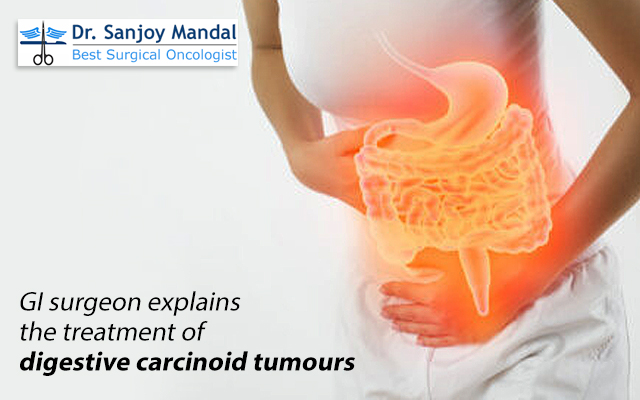Gastrointestinal or digestive carcinoid tumours are a type of cancer that develops in the lining of the GI tract. These tumours can spread to the liver, and other body parts said a GI surgeon in Kolkata.
Gastrointestinal carcinoid tumours do not have any signs or symptoms in the early stages, and as a result, they are difficult to diagnose.
Causes and symptoms of gastrointestinal carcinoid tumours: Explains GI surgeon
The exact cause of gastrointestinal carcinoid tumours is unknown. However, according to studies, it can be the result of the following factors:
● Multiple endocrine neoplasia type 1 or neurofibromatosis type 1 (NF1)
● If your stomach makes too much acid, a condition called Zollinger-Ellison syndrome
● Family history of carcinoid tumours
Researchers also found that women and older people tend to develop gastrointestinal carcinoid tumour more.
Most people having gastrointestinal carcinoid tumour do not have any symptoms. You only experience the symptoms when the tumour grows in size, stated top gastro surgeons in Kolkata. The symptoms include:
● Severe stomach pain
● Diarrhea
● Sudden weight loss for no reason
● Redness in the face
● Bleeding in the rectum
How is gastrointestinal carcinoid tumours diagnosed? Explains GI surgeon
Whenever you experience any unusual symptoms in your GI tract, it is advised to talk to a doctor and discuss your symptoms. If your gastro surgeon suspects any cancer growth, he will recommend you the following tests:
● Imaging tests like CT scan and MRI to find the location of the tumour
● Blood and urine tests to look for hormone levels which can indicate the growth of tumour
● Biopsy
● Endoscopy
Treatment of gastrointestinal carcinoid tumours: Explains GI surgeon
Depending upon the size of the tumour, cancer doctor will decide your treatment. Common treatments for gastrointestinal carcinoid cancer include:
● Surgery which includes removing the tumour and some surrounding healthy tissues to reduce the risk of spreading the tumour to other body parts.
● Radiation Therapy which uses high-energy radiation therapy to destroy cancer cells.
● Chemotherapy which involves the use of drugs to destroy the cancer cells. Chemotherapy is done when the tumour has spread to other body parts.
- Hormone therapy which involves injecting octreotide or lanreotide to slow down the tumour growth and prevent flushing and diarrhea.
Conclusion
Gastrointestinal carcinoid tumours are treatable. If you are concerned by any of the usual symptoms, make sure to do a cancer screening to start your treatment.
Here is one of the patients sharing his experience
“Sir is the best Gastrointestinal surgeon. Though I am not worthy to speak about Sir’s knowledge. But I can say that he has a excellent knowledge. Sir listen to each and every problem very carefully and after that he decribe about it very clearly. He is a person with great kind heart. My overall experience was really very good.Again I would like to give a big thank you to Sir.”
